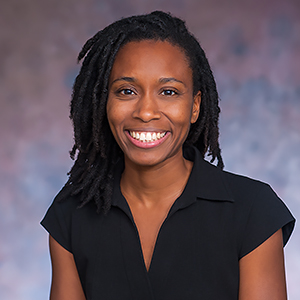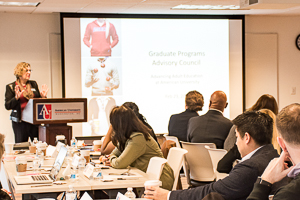I n February, I attended an advisory council meeting at Office of Graduate & Professional Studies alongside 20 senior executives. These thought leaders ranged from graduate-level program directors and practitioners to consultants and academes -- all convening to better understand how we could collectively bridge the gap between classroom learning and career excellence.
n February, I attended an advisory council meeting at Office of Graduate & Professional Studies alongside 20 senior executives. These thought leaders ranged from graduate-level program directors and practitioners to consultants and academes -- all convening to better understand how we could collectively bridge the gap between classroom learning and career excellence.
With so much expertise in one room, it was a treat to engage the group with a simple question: "How do our programs transform the challenges of the industry into opportunities in the job market?"
Up from our seats, I facilitated a lively discussion aided by large sticky paper and brightly colored markers where more than a dozen ideas and industry solutions were thrown into the frenzy.
SPExS Dean Carola Weil presenting at the February 2018 Graduate Programs Advisory Board at American UniversityThe results were ample. As program director and faculty for the Master's of Science in Measurement & Evaluation, it's routine to strategize with students and field experts about how they can distinguish themselves as career advancers. Here are three ways that building Evaluation skills can do this:
1. You'll be a Champion of Best-Practices
The academics who craft theory and the practitioners who apply it are rarely in contact with one another. A firm grounding in the latest developments in evaluation puts you in a competitive position to add value to any team. A strength of American University's M&E program lies in the engagement of scholar-practitioners to design and teach courses in a way that integrates emerging trends in evaluation throughout the curriculum.
Our advisory board and faculty experts make it their business to help students transfer foundational academic theory into practical workplace strategies. Moreover, as a program, we sponsor a year of membership in the American Evaluation Association (AEA), our parent organization and a place where academics and practitioners come together around best practices and innovations in evaluation. Skill-seekers make the most use of this membership by joining a topical interest group (TIG), reading newsletters, and engaging with other evaluators online and in person to hone their ability to transfer theory to practice in coursework and working in organizations.
2. You'll be a Data Linguist
When quantitative professionals gather in one camp and qualitative professionals in another, it limits the strength of data-driven decision making. Very few professionals are equally expert in quantitative and qualitative methods, but one can develop mixed methods research and evaluation skills to distinguish themselves among other candidates. We have structured the M&E program so that students can build a solid foundation of methods training. This is done through our Evaluation Qualitative Methods, Evaluation Quantitative Methods, and Data-Driven Decision-Making courses.
The data literacy of today's world requires evaluation professionals to be proficient in at least one of these methods, yet also develop a deep understanding at the application level of other methods to advance project goals. Building these methodological competencies prepares you to facilitate meaningful contributions in collaborative environments. You will lead the pack as a job market candidate and in promotion considerations.
3. You'll be a Cross-Functional Leader
Oftentimes, status quo approaches to work stifle innovation. The dynamic evaluation professional embraces imagination, curiosity, and creativity to listen intentionally, communicate empathetically, and wield analytical aptitude and technological savvy to inform strategic planning, decision making, and information dissemination. Distinguish yourself as the ideal talent with the cutting edge skills to ask the necessary questions in an inclusive and comprehensive way, to implement a consultative approach whether internal or external to an organization, to facilitate discussions across diverse stakeholder groups, to translate field-specific competencies to other applications within an organization, and to pitch new technologies as a pathway to more efficient work processes. Embrace true cross functionality to position yourself as an emerging organizational leader ready to contribute. Our three core professional skills courses, Intercultural Communication for Professionals, Innovation Through New Technologies, and Data-Driven Decision Making, enhance knowledge gained in the field-specific courses so you are poised to make an impact within and beyond your field of expertise.
Now more than ever, working professionals must seek expert-driven training to enrich their careers. Evaluation offers one pathway to build important skills in high demand across multiple expanding fields. I look forward to supporting students' strengths in these areas through American University's cutting-edge coursework, applied projects, and program-sponsored professional development.
*** To view original article, visit american.edu.
Align your education to the immediate and future industry needs with the Master of Science in Measurement and Evaluation from American University. Learn more now, or call 855-725-7614.



